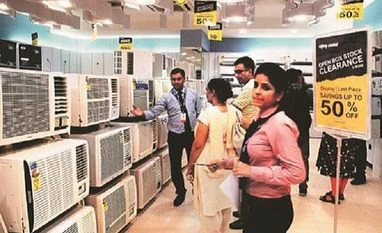Financial technology (fintech) unicorn Pine Labs is scaling up efforts to expand in India’s towns and hinterland. The firm is witnessing huge demand for its Buy Now, Pay Later (BNPL) services among the offline merchant community this festival season.
Pine Labs expects to process BNPL transactions worth Rs 5,000 crore and more this month as an increasing number of customers in small towns are buying products from physical stores availing of equated monthly instalments (EMIs).
These include products like smartphones, wearables, large appliances, smart televisions, and washing machines. Other categories where it is witnessing huge demand include fashion, apparel, and lifestyle products.
“We are expecting to cross Rs 5,000 crore in transaction value for BNPL for October. This is 100 per cent growth, compared to any average month,” said Mayur Mulani, business leader, Pay Later, Pine Labs, in an interview, adding, “This is also the first time people are stepping out after two years to shop for the festival season.”
Pine Labs, which is valued at $5.05 billion, competes with players like Razorpay, Paytm, and PayU. It is looking at forging ties with 100,000 stores for BNPL services this month. It has partnerships with brands like Samsung, Sony, Whirlpool, Xiaomi, and Oppo.
Mulani said the firm is enabling BNPL, along with merchants, even to customers buying a Rs 10,000-20,000 phone. “That has been a big lever for us and we see significant uptake,” said Mulani.
The firm said its merchants are in an advantageous position since it offers a growing network of leading banks and brands on its Pay Later platform. The company has built a robust and secure tech stack on its Android-powered point-of-sale (PoS) terminals. These ensure paperless Pay Later debit and credit card EMI transactions are validated and processed within seconds.
More From This Section
Pine Labs also recently entered the wearables segment in the consumer electronics category. Shoppers in India can purchase wearable devices of select brands on a BNPL arrangement using Pine Labs’ PoS terminals.
“We are going into tier III, IV, and V cities to work with merchant stores and change their behaviour about how EMI can increase their sales,” said Mulani, adding, “The brick-and-mortar stores were struggling a couple of years back, compared to the ease of transactions performed by online retail players. We really worked hard and got out (BNPL) products that give instant gratification to customers. The ease of transaction is also key to pushing affordability.”
Pine Labs is now enabling BNPL across a network of 15 major credit card issuers with a potential customer base of over 40 million. The company also introduced a first-of-its-kind EMI on debit cards and from non-banking financial companies (NBFCs) with a combined eligible base of 60 million.
India’s BNPL market is expected to grow to $45-50 billion by 2026, up from $3-3.5 billion as on date, according to experts. They said the number of BNPL users in the country might increase to 80-100 million by then, up from the present-day 10-15 million.
The pandemic led to a rise in digital lending by NBFCs and the proliferation of innovative credit products. About $25-30 billion credit was disbursed to 15 million BNPL users in 2020-21 as it emerged as the preferred credit of choice in the wake of Covid-19, according to a report by consulting firm Bain & Company.
It said short-term, small-ticket consumer loan products, which offer convenience and better customer experience, grew rapidly as the favoured mode of consumption financing.
Additionally, EMI-based credit card propositions are gaining traction in the small-ticket-sized segments.
“From a fintech perspective, we saw the emergence and scale-up of convenience BNPL, such as Simpl and LazyPay, affordability BNPL (ZestMoney), and card-based lending products,” said the Bain & Company report.
)